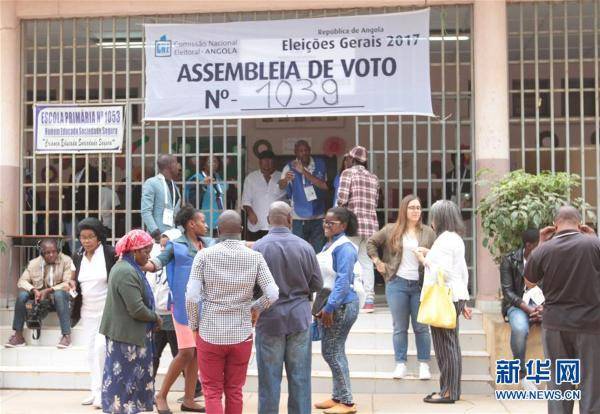Despite new hardships, Angola votes for independence & development
- By Caleb T. Maupin
 0 Comment(s)
0 Comment(s) Print
Print E-mail China.org.cn, September 8, 2017
E-mail China.org.cn, September 8, 2017
|
|
|
People stand outside the polling booth in Angola's capital Luanda on August 23, 2017 [Xinhua] |
The People's Movement for the Liberation of Angola (MPLA), the political organization that led the country's long independence struggle, has retained power in the latest election.
In the lead-up to the vote, Angola announced it was cutting oil production in cooperation with OPEC. As quoted by the Wall Street Journal, the Petroleum Minister explained, “It is better to cut production and make the price of oil rise instead of producing the maximum and selling at low prices.”
The recent history of oil-rich Angola shows the tragedy of the current global set-up, and the promise and potential offered by forces working to change it.
Until 1975, Angola was a colony of Portugal. London-based British Petroleum had primary access to the country's natural resources. Most of the population lived in extreme poverty, with their civil rights routinely infringed, while London and Wall Street bankers made huge profits.
The MPLA was formed by African people who did not want to live under apartheid conditions. With financial and military support from the Soviet Union and other socialist countries, the MPLA fought for and eventually won independence, when Portugal withdrew in 1975 during its own anti-fascist revolution.
As the MPLA grew more powerful in the 1960s and 70s, a tactic utilized by the British in Palestine and Kenya, was used by the forces seeking to keep Angola colonized. In addition to the direct fight between the MPLA and the Portuguese, a series of “counter-gangs” were created.
Various groups that were armed and trained by the West, but espoused nationalist, Pan-Africanist or Communistic politics, were utilized to attack the MPLA.
Even after independence, the war continued. U.S. made weapons flowed in. Tribal and ethnic rivalries were exploited. Any existing rivalry or tension that could keep Angolans killing each other, and not uniting to develop their country, was used. The apartheid government of South Africa even invaded Angola, but was driven back when Cuba sent troops to stand with the MPLA.
While BP remained in the country, cooperating with the MPLA government to extract and sell its oil, chaos and bloodshed kept Angola from really developing. Furthermore, a culture of corruption developed, as it often does in conditions of scarcity and war.
Though Angola was independent and led by a Marxist-Leninist political organization, it remained impoverished as it fought for its life in decades of civil war, instigated and promoted by the West.
When peace finally came in 2002, the world saw what Wall Street and London were truly afraid of. With lots of oil to sell on the market, and a revolutionary anti-imperialist party in control of the state, Angola finally saw some real, solid improvements in its living conditions.
Between 2003 and 2015 Angola's GDP increased by an annual average of 7.2 percent. With the support of China, new railways and highways were built. Parts of the country that had been completely isolated now gained access to the major cities.
However, the recent drop in oil prices devastated Angola, and put the progress of previous decade on hold. Unemployment is above 20 percent. In 2016, the GDP declined. Oil revenue accounted for half of the Angolan economy, and prices below US$30 per barrel proved devastating.
Though the MPLA was victorious in the recent election, the opposition party, friendly to the U.S. and hostile to China, made significant gains, taking advantage of the serious hardships.
With so many people killed during the wars, it is youth who now make up the majority of the population. They have their frustrations with corruption and continued poverty, and unlike their parents, loyalty to the MPLA has not been cemented over decades of struggle. Yet, the election showed that a solid majority of the country still backs the revolutionary leadership.
Angola's growing economic relationship with China opens up the possibility of eventually moving Angola away from the mercy of oil markets. Cooperation with China's Belt and Road Initiative holds the potential for Angola to develop industries and an economy of its own.
Angola remains a long way from eradicating poverty, with desperate conditions existing across its territories. It is this kind of dire poverty, and the terrorism, crime, drug gangs and human trafficking that is a negative byproduct, that China's New Silk Road aims to eliminate.
While Wall Street oil cartels would certainly benefit from political turmoil or more fighting in Angola, the people of the country have seen enough war. They voted for peace and economic development, with their growing relationship with China, and their campaign to erode corruption, efforts toward this goal can continue.
Caleb Maupin is a journalist and political analyst who resides in New York City focusing on U.S. foreign policy and the global system of monopoly capitalism and imperialism.
Opinion articles reflect the views of their authors only, not necessarily those of China.org.cn.







Go to Forum >>0 Comment(s)